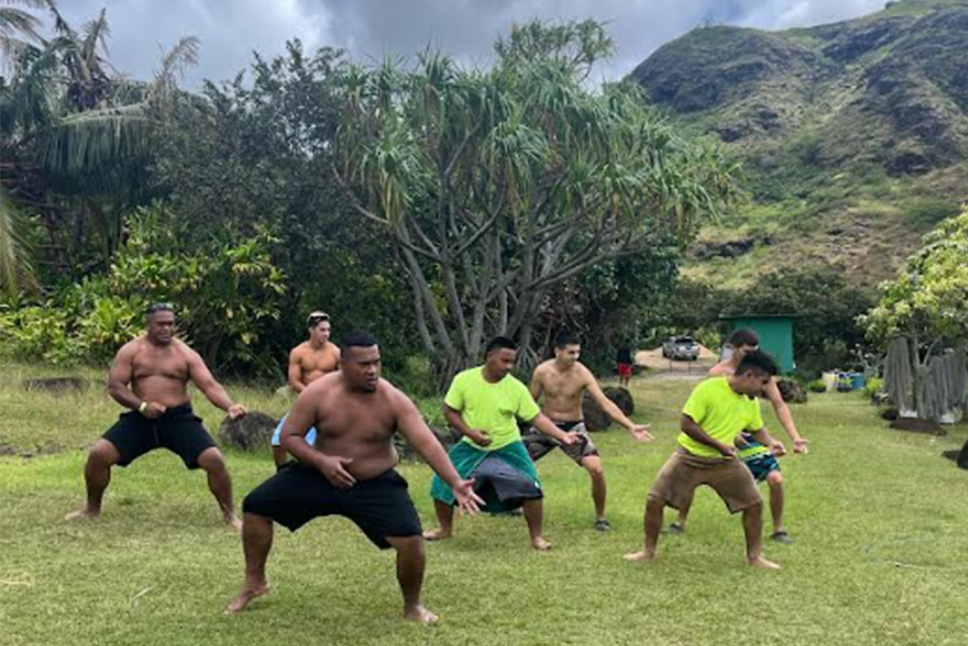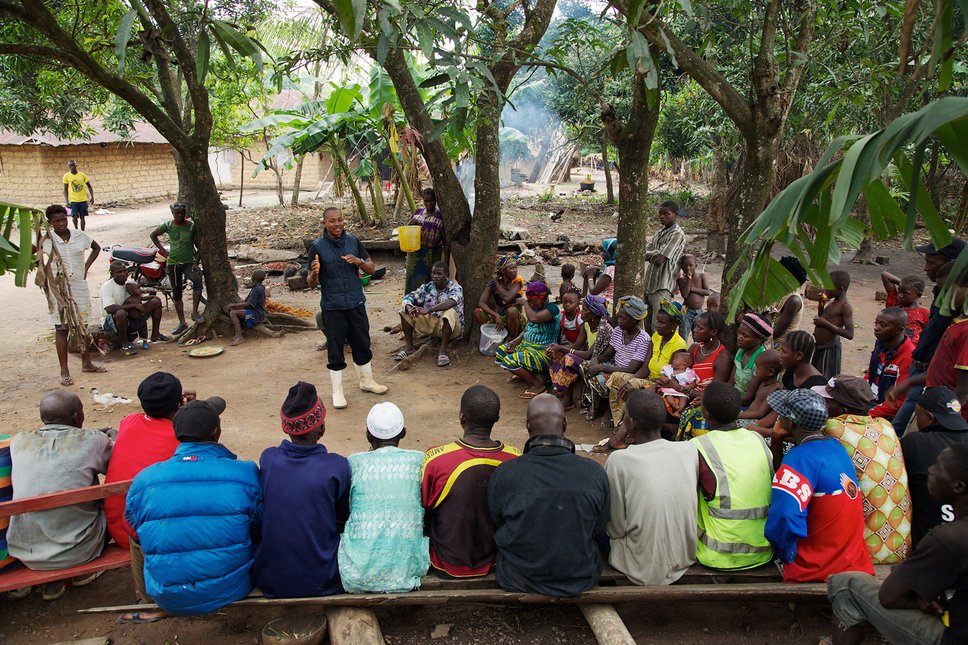While pursuing $20 million challenge grants, two organizations focused their long-term vision and learned about racial equity. After receiving the award, they’re expanding innovative, effective work.
In late 2020, a colleague mentioned to Shawn Malia Kanaʻiaupuni that the W.K. Kellogg Foundation (WKKF) in collaboration with Lever for Change was planning to award $90 million to initiatives that, over eight years, could drive a racially equitable future.
Kanaʻiaupuni was intrigued. Her Hawaiʻi-based organization, Partners in Development Foundation, had logged early successes as a partner in a Native-designed collaboration to end youth incarceration and help young people and families break generational cycles of entanglement in the justice system.

At the same time in Washington, D.C., Sonia Park and Erin Kitchell were leading an ambitious effort to overcome environmental racism in Africa, the U.S. and elsewhere. Their organization, Namati, was making progress by equipping communities of color to know, use and shape law.
Both organizations were among 1,453 initiatives from 72 countries that sent proposals to WKKF’s Racial Equity 2030 Global Challenge. In October of 2022, Partners in Development Foundation and Namati were notified that they had been selected as awardees. Each received $20 million from WKKF to pursue their missions.

The award, one of the largest and longest since Lever for Change was established in 2019 to generate more philanthropy, perhaps predictably brought a monumental lift to both organizations’ work. But the journey from making their proposals to being named finalists—arduous as it was—also was illuminating and rewarding.
“Going through the challenge was kind of a humbling experience that allowed us to really put our minds to the test of, ‘Okay, what would eight years down this path look like?’” recalled Kanaʻiaupuni, President and CEO of Partners in Development Foundation (PIDF). The foundation is the fiscal lead for Kawailoa: Opportunity Youth Action Hawaiʻi, a collaborative of foundations, and academic, community and state entities.
In composing their proposal, Kana’iaupuni and her colleagues met every week for six months “to put a fine point on what we were trying to accomplish,” she said, “but it was all part of the work that we were already doing.”
Many of those meetings ran for several hours on Saturdays. In the final weeks leading to the submission deadline, the group met for a couple full-day sessions.Beyond gaining a clearer understanding of its work, composing the proposal helped Kawailoa realize its connection to others performing racial justice work, especially for Indigenous peoples globally, Kanaʻiaupuni said.
“Then we submitted the proposal, and we were like, ‘Okay, well, whatever happens happens,” she said. “But it was good for us because we had all come together around this vision and it was a pretty cool vision.”
Like Kanaʻiaupuni, Park and Kitchell at Namati found that working on the Challenge prompted them to think about the organization’s long-term work and validated their approach, said Park, Namati’s Managing Director of Strategic Engagement.
“Thanks to the Kellogg Foundation’s expansive definition of racial justice,” she added, “we were able to hone our articulation of how legacies of slavery, colonialism, and many different forms of exclusion worsen the global environmental crisis and how our work tackles those challenges to advance racial, economic, and environmental justice.”
‘Crucial, huge’ planning grant
Particularly powerful for both organizations was WKKF’s innovative $1 million planning grant given to 10 finalists selected in September 2021. That selection came after a global, five-month evaluation from peers and experts. In addition to funding, each finalist received nine months of capacity-building support.
“It was a signal that the Kellogg Foundation and the Racial Challenge Equity 2030 team really understood the intense work it takes to strengthen and align goals, plans and budgets in a thoughtful, robust way for a project of this scope,” Park said. “And it also was a signal that they recognize that this would take us away from day-to-day things we might need to take care of but that this was important and will help us for this award and other, large major investment opportunities we may pursue.”
“Going through the challenge was kind of a humbling experience that allowed us to really put our minds to the test of, ‘Okay, what would eight years down this path look like?’”
Kanaʻiaupuni, President and CEO of Partners in Development Foundation
The grant also allowed Namati to continue investing in “organizational structure,” she added.
“I honestly wish more big bet funding opportunities out there adopted this approach of making planning grants or designed grants available for finalists,” Park said, “because it’s a lot of work.”
Kanaʻiaupuni agrees. All other grants to Kawailoa fund implementation of programs there, she noted. WKKF’s $1 million funded the planning, strategic testing, and feasibility analysis of different approaches. Kanaʻiaupuni called the grant “crucial, huge.”
The collaborative used part of the funding to pay executives and practitioners in the nonprofits that comprised the collaborative—including at least one executive director who had not collected a salary—to continue planning Kawailoa’s proposal in the Racial Equity Challenge.
“Then we were really diligent about thinking that, if it ends with us getting a million dollars, let’s make sure that half of it goes to the youth we serve,” she said. Kawailoa used funds to support work stipends, and training, Kanaʻiaupuni said.
In addition, Kawailoa used some of the $1 million to start the state’s first residential workforce development reentry program for young adults, operated by Kinai ʻEha. The organization, which provides education options for young people is, at any given time, moving about 10 youth from the adult prison system to a more productive path. The collaborative also helped launch a wellness and fitness initiative that facilitates community re-entry for the previously incarcerated.
“We decided early on that we were going to do this work no matter what,” she said, adding that WKKF “was critical to solidifying our resolve and helps us keep momentum and energy over time.”
In addition to financial support, the technical assistance from Dalberg Advisors and staff at Lever for Change was crucial to refining Kawailoa’s initiative, Kanaʻiaupuni said. Constructive criticism from Lever for Change and Dalberg and the chance to read other proposals as part of the peer review were especially informative.
Overall, the million-dollar investment boosted spirits and generated optimism that the Kawailoa model had a reasonable chance at the award.
“It was like, ‘Oh, these people believe in our ideas, too,’” Kanaʻiaupuni recalled. “’We know our aspirations are awesome. So, let’s really dig into how we can make them happen.’”
Community paralegals secure remedies
Established in 2012, Namati’s effectiveness relies on its innovative strategy of overcoming environmental racism by knowing, using, and shaping the law. Staff utilizes three concepts in that work: combining law and organizing, drawing lessons from specific grassroots struggles to drive broader reforms, and linking community struggles to global efforts. Namati works in the U.S., Sierre Leone, Kenya and regions in Asia.

“Much of what Namati does comes out of the human rights tradition and the legal aid tradition,” said Kitchell, Namati’s Managing Director of Land, Environment, and Climate. “But that combination of law and organizing really distinguishes how we do what we do and it’s a constant commitment to building community power.”
Added Park: “You’ll see a lot of organizations doing one or the other, but not marrying the two. Part of what distinguishes Namati is that we hold that complexity and somehow manage to navigate it in a comprehensive and harmonious way.”
It is extremely complex work that constantly must overcome significant power imbalances, and the growing rollback of community rights by authoritarian regimes, among other formidable challenges.
“The level of political pressure, intimidation and violence in many places right now against justice defenders is incredible,” Kitchell said, “and that’s being wielded even more against racial minorities and groups that have been historically marginalized.”
Against that backdrop, Namati has achieved concrete remedies to thousands of injustices, improving the lives of nearly 2 million people. Aided in part by WKKF funding, the organization has trained and deployed hundreds of paralegals to work with communities.
That initiative has been effective. In one recent case, paralegals worked in seven Sierre Leone communities where mining destroyed water sources and damaged crops.
“I honestly wish more big bet funding opportunities out there adopted this approach of making planning grants or designed grants available for finalists because it’s a lot of work.”
Sonia Park, Director, Strategic Engagement of Namati
The paralegal-community collaboration pointed out to the Environmental Protection Agency and the National Minerals Agency that the mining violated government licensing and was inflicting serious harm to residents. The licenses were suspended. The company acknowledged fault, rehabilitated water wells and paid compensation to farmers who had lost crops.
And in Kenya over the past year, paralegals supported by Namati have worked with six communities representing about 15,000 people to successfully register their land with government agencies.
Another years-long, Namati-led effort helped communities organize and advocate for specific reforms to land law that they identified as needs based on their experience, which led to Sierre Leone’s Customary Land Rights Act of 2022, monumental legislation that gives communities specific legal rights over their lands.
Globally, Namati convenes the Grassroots Justice Network, bringing together environmental justice practitioners and organizations in more than 180 countries to share their knowledge and develop approaches to advance justice.
Racial equity lessons
While Namati and Kawailoa already had established strong reputations for advancing racial equity, honing their initiatives in the Racial Equity Challenge 2030 led the two organizations to absorb lessons about racial equity internally.
Pursuing the WKKF grant made Kanaʻiaupuni appreciate the importance of elevating Indigenous peoples’ voices in the racial equity movement. During that process, Kawailoa committed to reach out and share its lessons with other communities of color.
“So, we’ve started building these bridges, with people from Australia, New Zealand, California and across the continent,” Kanaʻiaupuni said. “There are enough similarities and universal experiences where we can create that solidarity that allows us to move forward in unity and to challenge really egregious problems in our current systems.”
Park said Namati used part of the planning grant to train staff on disability rights and leadership concepts that staff can weave into their practices. Overall, the Challenge journey helped everyone at Namati gain a clearer understanding that racial justice and equity looks different in different countries.
“That was an important lesson for us,” she said. “The other thing is, at the end of the day, racial justice is about who holds power and how people and institutions use that power to advance or undermine justice.
“This has been an important lesson and reminder that the work of building power within communities that are often overburdened with environmental destruction is the essence of our work, and that’s the work that the Racial Equity Challenge 2030 awards us to do more of.”

Find more on the Racial Equity 2030 Global Challenge here, and more on other teams in Lever for Change’s Bold Solutions Network here.